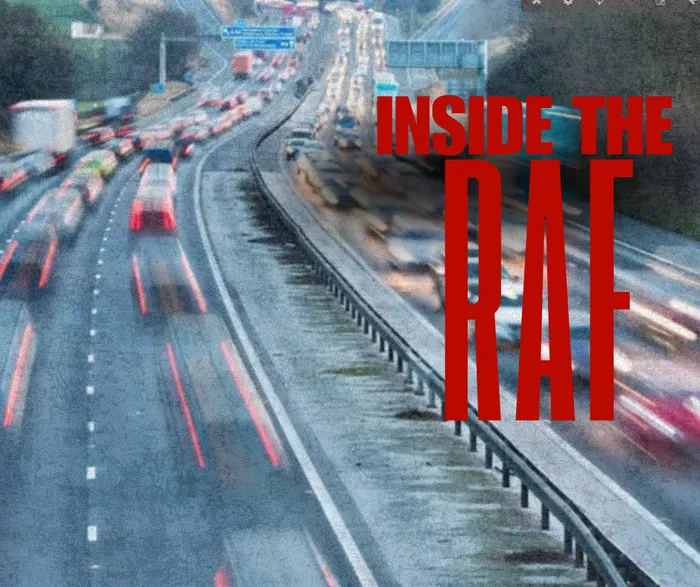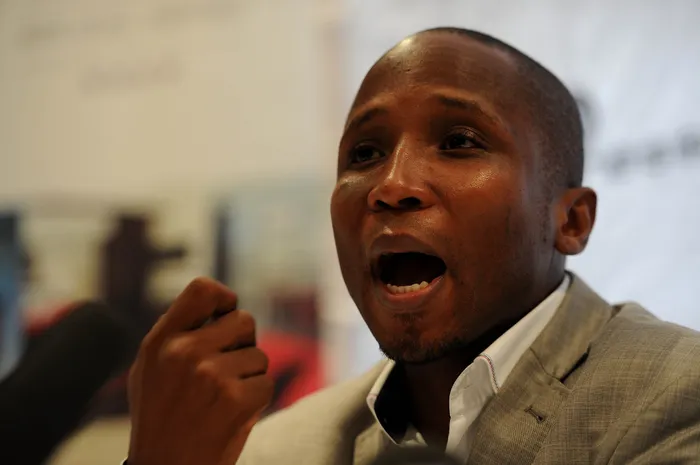
Thousands of accident victims depend on the Road Accident Fund for compensation — but mounting delays and financial troubles have left many waiting years for payouts.
Image: IOL Graphics
When a drunk driver hit Sipho Mdluli’s taxi in 2021, his left leg was shattered and his livelihood disappeared overnight.
Three years later, he’s still waiting for the Road Accident Fund (RAF) to pay his multi-million rand claim, and the impact of being jobless has also shattered his fledgling family.
“My case is handled by lawyers, and every time I check on them, they say my case was approved, but we have not received payment. Now I survive by borrowing from my extended family to survive.”
Mdluli’s story mirrors thousands of others caught in South Africa’s most important social compensation scheme — a safety net meant to protect every driver, passenger and pedestrian.
Today, that safety net is breaking apart.
The RAF was established to ensure that anyone injured or killed on South African roads would not face financial ruin.
Funded through a fuel levy of R2.18 per litre, the system once guaranteed help for victims regardless of fault.
But the levy has been frozen since 2019, even as medical and legal costs have soared.
The fund’s liabilities now exceed R518 billion, against R33 billion in assets — meaning it owes 15 times more than it owns.
The Auditor-General has repeatedly warned that the RAF’s finances are “not fairly presented” and flagged “material uncertainty” over its continued existence.
As Parliament’s Standing Committee on Public Accounts (SCOPA) investigates the depth of the crisis bedevilling the RAF, committee chairperson Songezo Zibi says the human cost is already devastating.
“A broken RAF means it’s going to be very difficult for a lot of people,” Zibi told IOL.
“Right now there are people who need wheelchairs, but they don’t have them. Someone who is a victim of a road accident needs a caregiver right now, and they can’t afford one. “Someone needs their car adjusted so they can drive with their hands. The RAF was created to make those things possible,” said Zibi.
He says the fund’s apparent collapse has left “people stranded between injury and dignity,” unable to access the basic services that compensation was meant to provide.
“A broken RAF means all these people simply don’t have access to critical services — medical transport, therapy, assistive devices. It is not just a financial crisis, it’s a human one.”
Zibi believes the current funding model is the root of the problem.
“This is a funding problem that the government and Parliament must solve. It’s not the fault of RAF management alone. The model doesn’t work, and the obligations placed on the fund don’t work either.”
Zibi argues that the law itself needs a complete overhaul. Under current regulations, the RAF must pay accident victims upfront — often in large lump sums meant to cover lifelong expenses.
“The regulations say that for victims’ expenses, the RAF must pay everything upfront. That’s not necessary,” he explained. “Why can’t it be budgeted on an annual basis? You don’t need to get all your money at once.”
He believes this practice fuels unsustainable cash-flow pressures — and sometimes leads to misuse of the lump sums.
“Some people receive the full payout and spend it within a short while,” he said. “If instead we made annual or monthly payments, people would still get help, but the fund could survive.”
His proposal: reform the law so the RAF can make structured annual or monthly disbursements, or issue vouchers for medical services.
“You don’t need R30 million in your bank account,” he said. “The state can budget maybe R180 000 a year, or give you a voucher for your medical check-ups. We must improve how cash flow is managed — otherwise the RAF will keep paying huge sums and it’s not sustainable.”
He added that these were his personal views, not yet SCOPA’s collective position, but that the committee will consider them when it recommends reforms.
For Zibi, simply raising the levy isn’t a solution.
“The fuel levy as a mechanism is not enough,” he said. “I don’t think it should be increased. We must start doing what’s done in other countries.”
He proposes that third-party insurance be built into vehicle licensing fees — a model where every car owner contributes a small annual insurance premium that covers accident victims.
“If I’m driving and cause an accident, the RAF indemnifies me by paying the people I’ve injured,” he said. “But what should happen is that part of your licence fee becomes your insurance premium. From that pool of money, we can pay victims. The fuel levy shouldn’t be the only source.”
While SCOPA works on reforms, opposition MPs warn that the RAF’s finances are even worse than reported.
ActionSA Member of Parliament Alan Beesley told IOL that during SCOPA’s inquiry, his party questioned the Auditor-General of South Africa about unrecorded liabilities — money owed to claimants but missing from the RAF’s books.
“The AGSA confirmed that the total can’t be estimated. In essence, nobody knows how deep this hole is,” Beesley said. “Our calculations show unrecorded liabilities exceeding R500 billion — nearly a fifth of the national budget.”
He called the situation “one of the most serious financial misstatements by any state entity in democratic South Africa” and urged charges against the former RAF board.

Former RAF CEO challenges SCOPA’s authority to inquire about the entity’s financial management.
Image: SAPS
“Ultimately, it will be ordinary taxpayers who pay the price,” he warned.
ActionSA said it fully supports SCOPA in its resolution to secure the appearance of former RAF CEO, Collins Letsoalo, as a witness in its ongoing inquiry into alleged maladministration, financial misconduct, and the misuse of public funds at the Fund.
“The integrity of Parliament’s oversight process cannot be compromised by the refusal or evasion of key witnesses, particularly those who held executive authority over the entity under investigation,” the party added.
Zibi said the committee will soon convene and discuss whether Letsoalo must be subpoenaed to appear.
“He hasn't come back to us, so the committee will try to set up a date for a discussion, to decide whether we issue him a subpoena. But we have not met yet,” said Zibi, also national leader of the political party RISE Mzansi.
Recent reports cited a whistle-blower affidavit alleging that the RAF spent more than R10 million on personal security arrangements for Letsoalo — including hotel stays for bodyguards — at a time when the fund was already under intense fiscal pressure.
According to multiple media investigations, the spending included a roughly R4 million armoured BMW and the deployment of nine bodyguards, some of whom were reportedly assigned to guard Letsoalo’s family rather than perform strictly corporate protection tasks.
Industry stakeholders echo the concern. Gavin Kelly, CEO of the Road Freight Association, says the RAF has strayed far from its founding purpose.
“The Road Accident Fund was designed to replace the compulsory Third Party Licence - a second disc on the windscreen of a motor vehicle - by accessing an allocation from every litre of fuel sold. The idea was that persons injured or killed in road crashes (the RAF uses the term "accident") would be compensated for loss and not have to rely on relief from the driver of the vehicle after a legal process was followed," Kelly told IOL.
"Over the past few decades, the RAF has become embroiled in battles between the legal fraternity, claimants, and the State whose funds did not reach crash victims, but were sidelined into other pockets. Various legal actions have been ongoing."
He said the result for the road crash victims has been that payouts from the RAF have been severely delayed, severely reduced, or even "lost" in the battles that have been ensuing.
"It is critically important that third parties, the people who had no role to play in the crash, are promptly compensated for their loss or medical expenses. The Road Freight Association (RFA) has proposed that the RAF process be run by current short-term insurers, who have both the capacity to collect and to deal with claims, as was done before the advent of the RAF," said Kelly.
"Discs/proof of insurance can still be purchased, and the fuel levy portion held in a central account for use by the various insurance companies when settling claims.
"A paralysed RAF leaves travellers - third party individuals - exposed to severe risk and personal cost should they be involved in a crash just by being a passenger or pedestrian," he said.
Amid growing criticism, the RAF announced this month a record one-day payout of R694 million, claiming to have disbursed R17.3 billion since April as part of a turnaround plan. It also paid R4.18 billion in September alone.
“Dignity continues to be restored to thousands of claimants,” the RAF said in its statement, pledging faster claims processing and stronger governance.
Critics, however, warn that faster payments alone will not solve a structural deficit or a broken law.
For victims like Mdluli, the headlines about record payouts mean little. His calls to the lawyers sometimes go unanswered. His file still sits somewhere in a queue inside a system drowning in debt.
“The RAF is supposed to protect us,” he says quietly. “Now it’s just another government department that doesn’t pay.”
As SCOPA’s inquiry continues, Zibi says Parliament must do more than expose failure — it must design a system that works.
“We can’t just keep diagnosing the problem,” he said. “We have to rebuild this fund so it serves people with dignity.”
Until that happens, South Africa’s promise of protection for road-crash victims remains just that — a promise.
IOL News